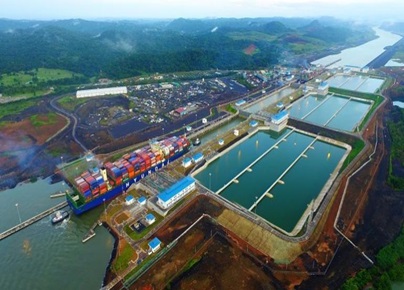Panama Canal Applies New Transit Reduction Due to Drought
2023-11-03

The Panama Canal, which is facing a severe drought, announced that it will gradually reduce the number of ship crossings starting November 3 to save water.
The Panama Canal Authority (ACP) indicated that it plans to initially cut daily crossings through this waterway, which moves almost 6% of the world's maritime trade, from 29 to 25. In 2022, an average of 39 ships passed through per day, but the number had been decreasing for months.
"The month of October has been the driest since records began 73 years ago. The drought caused by the El Niño phenomenon continues to severely impact the reservoir system of the Panama Canal and, therefore, the availability of water has been reduced," the ACP informed on its website.
He said that from November 3 to 7, only 25 vessels will be able to cross per day; from November 8 to 30, about 24 ships, 22 vessels in December, 20 units in January, and 18 units per day from February 2024.
"The late arrival of the rainy season this year and the lack of rainfall in the Canal basin has forced the Canal to reduce traffic," the ACP explained in a message sent to its customers.
The Canal has also reduced the draught of vessels, forcing some ships to unload containers before entering the waterway.
The new reduction in traffic will indeed cause a further decrease in their income. The ACP had forecast a $200 million drop in revenue in 2024 a few months ago.
In August, the Canal's administrator, Ricaurte Vásquez, said the waterway needed an additional source of fresh water to be able to operate at full capacity, so the construction of a reservoir on a river was under study.
The Panamanian highway uses fresh water, which is obtained from abundant tropical rainfall.
Gatun is the main reservoir that allows the operation of the Canal, inaugurated by the United States in 1914.
For decades, the abundance of rainfall ensured the operation of the Canal, but it has diminished considerably.
With each ship passing through a lock of the Panama Canal, 200 million litres of fresh water are poured into the sea. To save money, the number of daily crossings was reduced this year from 39 to 32 and currently to 29.
Vásquez said that the construction of a dam on the Indian River, west of the road, is being studied, whose waters would be carried through a tunnel about 8 km long to Gatun Lake. Extracting water from Lake Bayano, located in the east, is also being studied.
The purpose is not only to provide more water for the crossing of ships in the Canal but also to ensure the supply of drinking water in the most populated area of the country.
The reduction in crossings prompted the Canal to auction off the few available slots, and a few months ago a chemical tanker paid a record $2.4 million to avoid the waiting line. The queue had a record 163 vessels on August 9, according to the ACP.









